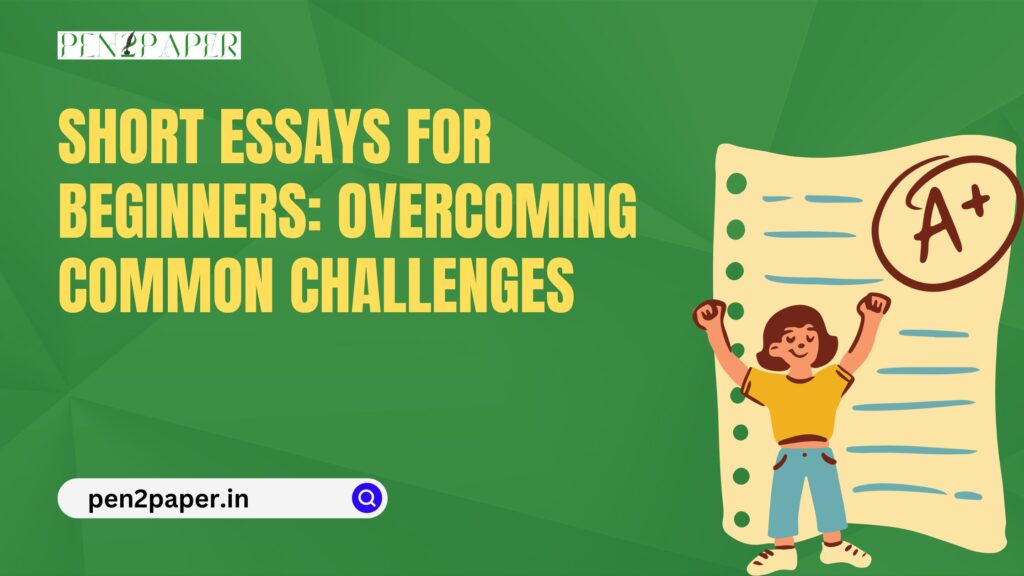Short essays are a cornerstone of academic and professional writing. Whether you’re a student preparing an assignment or a professional drafting concise reports, mastering the art of short essays is crucial. These compact pieces of writing demand precision, clarity, and organization—skills that can be challenging for beginners. In this guide, we will explore common challenges faced when writing short essays and provide practical tips to overcome them.

What Are Short Essays?
Short essays typically range between 250 to 750 words and focus on a single topic or idea. Unlike longer essays, short essays require writers to be concise while still presenting a complete argument or narrative. They are often used in academic settings, professional tasks, and personal expression. Despite their brevity, crafting impactful short essays requires a strategic approach.
Common Challenges in Writing Short Essays
1. Condensing Ideas Effectively
One of the biggest challenges in writing short essays is condensing complex ideas into a limited word count. Beginners often struggle to decide what information to include and what to leave out.
Solution: Prioritize the main argument or theme of your essay. Use an outline to organize your thoughts and ensure every sentence serves a purpose.
2. Maintaining Clarity
Short essays require clarity in every sentence. Beginners may find it difficult to communicate their ideas without unnecessary jargon or vague statements.
Solution: Write in simple, straightforward language. Avoid filler words and focus on delivering your message in as few words as possible.
3. Structuring the Essay
Many beginners struggle with structuring short essays due to the limited space for introduction, body, and conclusion.
Solution: Use a clear structure:
- Introduction: Start with a hook and introduce the main idea.
- Body: Develop 2-3 key points with supporting evidence.
- Conclusion: Summarize the main argument and provide a closing thought.
4. Avoiding Repetition
In an attempt to meet the word count, beginners might repeat ideas, making the essay redundant.
Solution: Focus on providing unique points or perspectives. Edit your essay thoroughly to remove repetitive content.
5. Staying Within the Word Limit
Exceeding the word limit is a common issue for beginners writing short essays.
Solution: Practice writing within a specified word count. Review and trim unnecessary sentences without losing the core message.
Tips for Writing Excellent Short Essays
1. Understand the Purpose
Every short essay serves a purpose, whether it’s to inform, persuade, or narrate. Understanding the purpose helps you stay focused and relevant.
2. Plan Before Writing
An effective plan is crucial for short essays. Create an outline with a clear introduction, body points, and conclusion before you start writing.
3. Start with a Strong Thesis Statement
Your thesis statement should summarize the main point of your essay. It sets the tone and provides direction for the entire piece.
4. Use Strong Supporting Evidence
Even in short essays, evidence is essential to back up your claims. Use statistics, quotes, or examples to strengthen your arguments.
5. Edit Ruthlessly
Editing is a critical step in writing short essays. Check for grammar errors, unclear sentences, and unnecessary details. Tighten your language to make the essay concise and impactful.
How to Practice Writing Short Essays
1. Start Small
Begin with topics you’re familiar with. Practice writing 250-300 word essays to get comfortable with brevity.
2. Seek Feedback
Share your essays with peers or mentors for constructive criticism. Feedback can help you identify areas for improvement.
3. Read Examples
Study well-written short essays to understand their structure, tone, and style. Analyzing examples can inspire your writing.
4. Use Writing Prompts
Prompts can help you practice and spark creativity. Set a timer and write a short essay based on a given topic to improve your skills.
Why Short Essays Matter
Short essays are more than just a writing exercise. They teach you to think critically, organize your thoughts, and communicate effectively. These skills are invaluable not only in academics but also in professional and personal life.
Final Thoughts
Short essays may seem daunting at first, but with practice and the right strategies, you can master this essential skill. By understanding the challenges and implementing the tips shared in this guide, beginners can confidently write short essays that are concise, clear, and impactful. Remember, every great writer started as a beginner—and so can you!
Short essays are a cornerstone of academic and professional writing. Whether you’re a student preparing an assignment or a professional drafting concise reports, mastering the art of short essays is crucial. These compact pieces of writing demand precision, clarity, and organization—skills that can be challenging for beginners. In this guide, we will explore common challenges faced when writing short essays and provide practical tips to overcome them.
What Are Short Essays?
Short essays typically range between 250 to 750 words and focus on a single topic or idea. Unlike longer essays, short essays require writers to be concise while still presenting a complete argument or narrative. They are often used in academic settings, professional tasks, and personal expression. Despite their brevity, crafting impactful short essays requires a strategic approach.
Common Challenges in Writing Short Essays
1. Condensing Ideas Effectively
One of the biggest challenges in writing short essays is condensing complex ideas into a limited word count. Beginners often struggle to decide what information to include and what to leave out.
Solution: Prioritize the main argument or theme of your essay. Use an outline to organize your thoughts and ensure every sentence serves a purpose.
2. Maintaining Clarity
Short essays require clarity in every sentence. Beginners may find it difficult to communicate their ideas without unnecessary jargon or vague statements.
Solution: Write in simple, straightforward language. Avoid filler words and focus on delivering your message in as few words as possible.
3. Structuring the Essay
Many beginners struggle with structuring short essays due to the limited space for introduction, body, and conclusion.
Solution: Use a clear structure:
- Introduction: Start with a hook and introduce the main idea.
- Body: Develop 2-3 key points with supporting evidence.
- Conclusion: Summarize the main argument and provide a closing thought.
4. Avoiding Repetition
In an attempt to meet the word count, beginners might repeat ideas, making the essay redundant.
Solution: Focus on providing unique points or perspectives. Edit your essay thoroughly to remove repetitive content.
5. Staying Within the Word Limit
Exceeding the word limit is a common issue for beginners writing short essays.
Solution: Practice writing within a specified word count. Review and trim unnecessary sentences without losing the core message.
Tips for Writing Excellent Short Essays
1. Understand the Purpose
Every short essay serves a purpose, whether it’s to inform, persuade, or narrate. Understanding the purpose helps you stay focused and relevant.
2. Plan Before Writing
An effective plan is crucial for short essays. Create an outline with a clear introduction, body points, and conclusion before you start writing.
3. Start with a Strong Thesis Statement
Your thesis statement should summarize the main point of your essay. It sets the tone and provides direction for the entire piece.
4. Use Strong Supporting Evidence
Even in short essays, evidence is essential to back up your claims. Use statistics, quotes, or examples to strengthen your arguments.
5. Edit Ruthlessly
Editing is a critical step in writing short essays. Check for grammar errors, unclear sentences, and unnecessary details. Tighten your language to make the essay concise and impactful.
How to Practice Writing Short Essays
1. Start Small
Begin with topics you’re familiar with. Practice writing 250-300 word essays to get comfortable with brevity.
2. Seek Feedback
Share your essays with peers or mentors for constructive criticism. Feedback can help you identify areas for improvement.
3. Read Examples
Study well-written short essays to understand their structure, tone, and style. Analyzing examples can inspire your writing.
4. Use Writing Prompts
Prompts can help you practice and spark creativity. Set a timer and write a short essay based on a given topic to improve your skills.
Why Short Essays Matter
Short essays are more than just a writing exercise. They teach you to think critically, organize your thoughts, and communicate effectively. These skills are invaluable not only in academics but also in professional and personal life.
Final Thoughts
Short essays may seem daunting at first, but with practice and the right strategies, you can master this essential skill. By understanding the challenges and implementing the tips shared in this guide, beginners can confidently write short essays that are concise, clear, and impactful. Remember, every great writer started as a beginner—and so can you!
